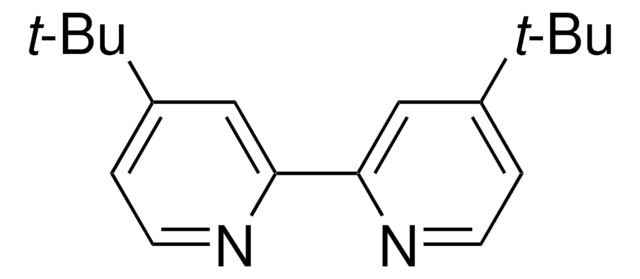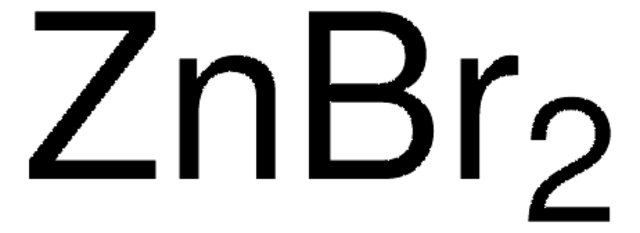746355
Zinc chloride
anhydrous, free-flowing, Redi-Dri™, ACS reagent, ≥97%
Sinónimos:
Dichlorozinc
About This Item
anhydrous
Productos recomendados
grade
ACS reagent
anhydrous
Quality Level
vapor pressure
1 mmHg ( 428 °C)
product line
Redi-Dri™
assay
≥97%
form
powder, crystals or granules
quality
free-flowing
reaction suitability
reagent type: catalyst
core: zinc
impurities
Oxychloride, passes test
≤0.005% insolubles
pH
5 (20 °C, 100 g/L)
mp
293 °C (lit.)
anion traces
nitrate (NO3-): ≤0.003%
sulfate (SO42-): ≤0.01%
cation traces
Ca: ≤0.06%
Fe: ≤0.001%
K: ≤0.02%
Mg: ≤0.01%
NH4+: ≤0.005%
Na: ≤0.05%
Pb: ≤0.005%
SMILES string
[Cl-].[Cl-].[Zn++]
InChI
1S/2ClH.Zn/h2*1H;/q;;+2/p-2
InChI key
JIAARYAFYJHUJI-UHFFFAOYSA-L
¿Está buscando productos similares? Visita Guía de comparación de productos
General description
Application
- A catalyst to synthesize 5-substituted 1H-tetrazoles by [3 + 2] cycloaddition reaction of organic nitriles with sodium azide.
- A reagent to promote the hydrolysis of NaBH4 for the generation of hydrogen.
- A reagent for the activation of carbon materials.
Legal Information
signalword
Danger
hcodes
Hazard Classifications
Acute Tox. 4 Oral - Aquatic Acute 1 - Aquatic Chronic 1 - Eye Dam. 1 - Skin Corr. 1B - STOT SE 3
target_organs
Respiratory system
Storage Class
8B - Non-combustible corrosive hazardous materials
wgk_germany
WGK 3
flash_point_f
Not applicable
flash_point_c
Not applicable
Elija entre una de las versiones más recientes:
¿Ya tiene este producto?
Encuentre la documentación para los productos que ha comprado recientemente en la Biblioteca de documentos.
Los clientes también vieron
Artículos
Redi-Dri™ prevents hygroscopic powders, such as inorganic salts, from absorbing moisture and forming clumps, leaving the salts free-flowing every time.
Nuestro equipo de científicos tiene experiencia en todas las áreas de investigación: Ciencias de la vida, Ciencia de los materiales, Síntesis química, Cromatografía, Analítica y muchas otras.
Póngase en contacto con el Servicio técnico








